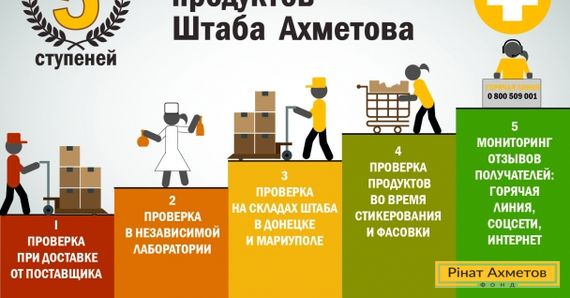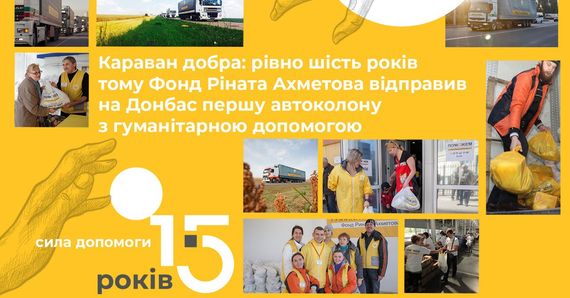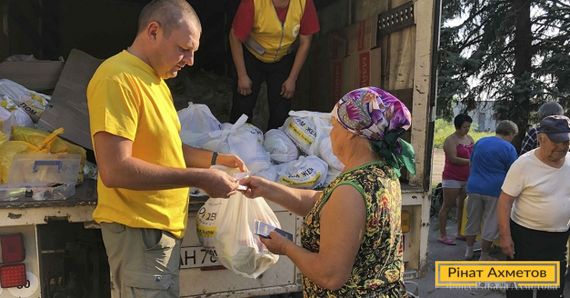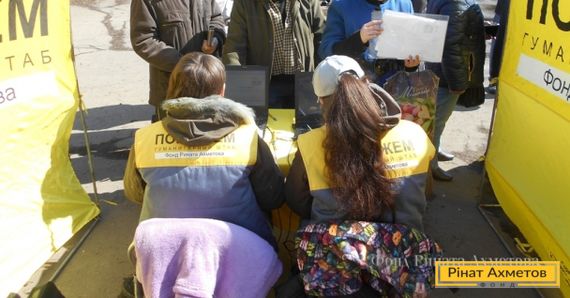How is the quality control of food products from Rinat Akhmetov Humanitarian Center going?

Rinat Akhmetov Humanitarian Center ensures quality control of issued products at all stages of humanitarian aid provision: from purchase to food basket issuance into recipient's hands. According to Ukrainian legislation, all the food products referring to humanitarian aid must be confirmed by quality certificates and have a long shelf-life.
"Based on the volumes of purchased products, Rinat Akhmetov Humanitarian Center is one of the largest customers at the food market of Ukraine. Initially, it was decided to work only with Ukrainian manufacturers, from whom we purchase 5,500 tons per month. Our main principle when purchasing products is the "price-quality- manufacturer's reputation" ratio. We buy very large volumes, and by certain types of products we provide a complete turnover for some plants. At the same time the Humanitarian Center controls the quality and bears responsibility for every issued survival kit", – Oleksandr Vyshniakov, the Humanitarian Center's Director, shared.
Over 1.5 years of its operation the Humanitarian Center built one big assistance mechanism from scratch: product purchases, their storage at the distribution centre in Dnipropetrovsk, delivery to logistics warehouses of the Humanitarian Center in Donetsk and Mariupol, organization of survival kit issuance. Every month 500,000 people receive their food packages.
The quality control over products from the Humanitarian Center consists of five stages:
1. Inspection when delivering products from a supplier
All the purchased products are delivered to distribution centre in Dnipropetrovsk. When receiving a new batch of food we check the certificates of quality, package integrity and shelf-life of the product. In the case the supplied products are of low quality, the supplier is responsible and obligated to make the complete replacement of the goods.
2. Inspection by an independent laboratory
Each product from food package undergoes quality inspection by an independent laboratory: organoleptic (indicators of taste, smell, texture, colour, absence of foreign admixtures) and physical-technical (indicators of product weight and amount of salt in it). After the expertise is finished, the Humanitarian Center gets certified report with the study results.
3. Inspection at the Humanitarian Center's warehouses in Donetsk and Mariupol
The volunteers of logistic centres in Donetsk and Mariupol make product inspections during truck convoy unloading: compliance with temperature control in the trucks and the quality of product packaging. The warehouse centres observe all health standards and zoning rules, the products are stored in compliance with temperature and humidity levels.
4. Product inspection during stickering and packaging
These procedures are made during food package formation at the logistic centres. The volunteers sticker every product unit with a sign saying "Humanitarian aid. Not for sale" and doublecheck the products again.
5. Monitoring of recipients' feedbacks: hotline, social media, Internet.
The Humanitarian Center's hotline. People are leaving their suggestions on improvement of the Humanitarian Center's and issuing points' operation and feedbacks on food packages. The Humanitarian Center's employees are processing every feedback and eliminate the problems. Also our hotline operators are calling about 5,000 recipients a month to get a feedback on our work.
Social media and Internet. The Humanitarian Center's employees are monitoring recipients' comments and opinions to get a feedback on the product quality.
.jpg?content_type=image%2Fjpeg&disposition=inline%3B+filename%3D%22photo5332632614940553424+%25281%2529.jpg%22%3B+filename%2A%3DUTF-8%27%27photo5332632614940553424%2520%25281%2529.jpg)



